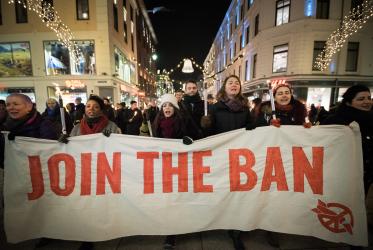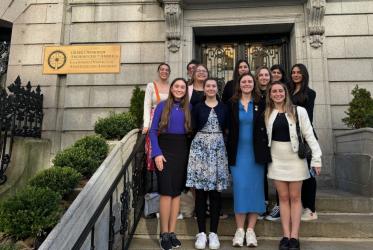Important votes at the United Nations (UN) in early November give an indication of how much of the world wants new action to eliminate nuclear weapons, and how determined the main nuclear powers and their allies are to resist such long-overdue change.
The World Council of Churches (WCC) has a special stake in this year's votes, after accompanying church leaders from seven countries that rely on nuclear weapons on a pilgrimage to Hiroshima and Nagasaki in August. A goal of the trip was to engage each government to reconsider their continued reliance on nuclear weapons in light of what happened to the two cities and what is now known about the effects of such weapons.
This week the seven governments have been showing their colors in votes at the United Nations. The United States and South Korea voted against three widely-supported General Assembly resolutions calling for nuclear abolition on legal, humanitarian and ethical grounds. Germany and the Netherlands joined them in these "no" votes twice, and Norway joined them once. All three countries are NATO allies of the United States.
On a more positive note, Norway, Japan and Pakistan abstained on the key resolution that calls for filling the legal gap around nuclear weapons. Also, Japan voted for the resolution condemning the catastrophic humanitarian consequences of nuclear weapons, and Germany, Norway, the Netherlands and Pakistan abstained.
Meanwhile, all three resolutions passed with majorities of between 124 and 133 governments out of the 154 to 175 governments voting.
“Even if these UN votes are no breakthrough yet in getting the nuclear powers and nuclear-umbrella states to take serious steps toward disarmament and abolishing nuclear weapons in the long run, this vote shows the wide support for a movement in that direction. We as churches will not grow tired in encouraging our governments to join in!”, said Bishop Heinrich Bedford-Strohm, chair of the Council of the Evangelical Church in Germany and a member of the pilgrimage to Japan.
"In Hiroshima and Nagasaki, our delegation visited with some of the first victims of the atomic age. Their witness was a blessing and an inspiration to us. Ever larger majorities voting for nuclear disarmament at the UN today are a welcome sign of how many share their belief that nuclear disarmament is possible--and I would add, especially by the grace of God," said Rev. Dr Stephen Sidorak, a United Methodist Church official and member of the WCC's Commission of the Churches on International Affairs.
“The three resolutions on the humanitarian consequences of nuclear weapons, the humanitarian pledge and the ethical imperative are encouraging signs of the power of many people of good will — governments and civil society — to make the right decisions in ensuring a shared future safeguarded from the sin of nuclear weapons,” Dr Emily Welty, acting moderator of the WCC Commission of the Churches on International Affairs, noted. “May this be another step along our journey toward justice and peace," Welty added.
Members of ICAN, the International Campaign for the Abolition of Nuclear Weapons, which includes the WCC, worked to build support for the resolutions.
WCC pilgrims remember atom bomb’s deadly destruction 70 years ago in Hiroshima
“The world must be freed of nuclear weapons”
ICAN’s African supporters reflect on why they abhor nuclear weapons






